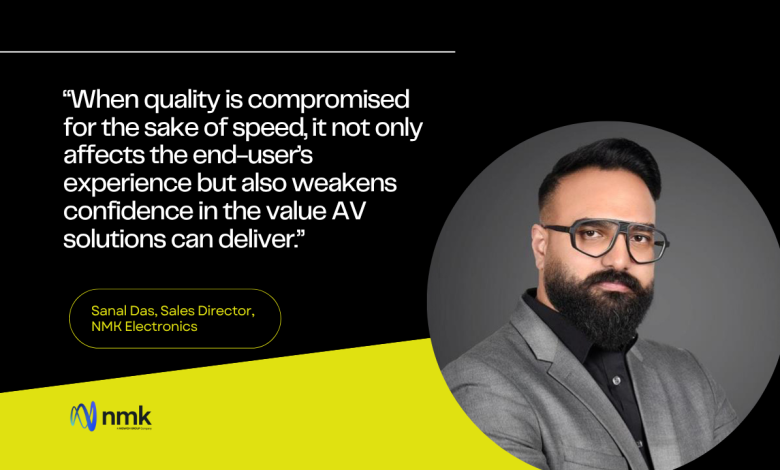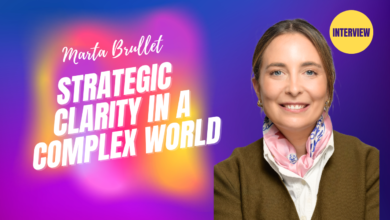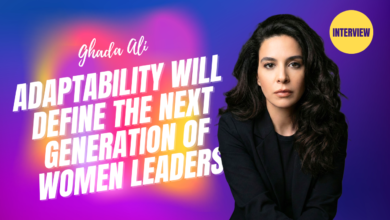“There is a Growing Appetite for End-to-End Solutions”

Sanal Das, the Sales Director at NMK Electronics, says, success now depends on adaptability, technical fluency, and the ability to deliver integrated solutions that align with modern user expectations.
Could you share an overview of your career path to date, highlighting the pivotal moments or achievements that have shaped your leadership within the IT channel?
My career in the distribution business began in 2008, where I started as a design and estimation engineer. This foundational role gave me an early understanding of the importance of listening closely to customer needs and tailoring solutions accordingly. It also taught me the value of clear, detailed communication, not just with our direct customers, but also with their end users. That experience laid the groundwork for my eventual transition into sales.
In 2017, I joined NMK as the brand manager for Bose Professional Systems. Managing such a well-established and sought-after brand in the region meant engaging with a wide spectrum of channel partners across different verticals—from systems integrators to retail and pro AV (audio visual) clients. My technical background gave me a strong edge in solution selling, allowing me to position not just the brand I represented, but a wider integrated portfolio of solutions from other top-tier brands NMK carried.
When the company began shifting its strategy from traditional box selling to a more solution-oriented approach, I was entrusted with a newly created role of Key Account Manager. It was a natural fit, as the role demanded more than just sales—it was about building trust, nurturing long-term relationships, and becoming a strategic partner to our clients. I continued to manage the brand alongside this role until we built a structured team, at which point I focused on shaping the new department’s processes, aligning team members with our company’s mission and vision.
This led to my promotion as Director of Key Account Management, and later to my current position as Sales Director, overseeing our full sales operations which include Key Account Managers, Inside Sales, and Retail Sales teams. The past seven years have certainly come with their share of challenges, especially as the partner and the channel landscapes continue to evolve rapidly.
But I’ve always believed that every challenge presents an opportunity to grow. With the consistent support of our leadership team and a commitment to learning and adapting, those experiences have played a vital role in shaping the leadership approach I bring to the distribution channel today.
As a key channel influencer within your company, what are your primary roles and responsibilities in shaping strategy, driving engagement, and fostering growth within the partner ecosystem?
As Sales Director at NMK, my role goes beyond overseeing sales targets. It’s about shaping and sustaining a channel ecosystem that’s built on trust, consistency, and long-term value. A large part of this responsibility involves continuously understanding how the market is evolving and aligning our internal strategies and teams to meet those changing expectations.
One of my core focus areas is ensuring we maintain consistency in our engagement with partners, something we, at NMK, deeply value. Though we do recognize it’s not always easy to achieve, it requires a combination of ongoing training, clear communication, and a motivated team that’s aligned with both short-term objectives and long-term vision.
Internally, I believe in strong interdepartmental coordination whether it’s with logistics, marketing, or technical support—to ensure we meet customer expectations holistically. It’s not just about delivering products; it’s also about enhancing the visibility and reputation of NMK as a reliable partner in the region.
Importantly, our strategy is not just centred around acquiring new partners, but also in retaining and growing existing relationships. I know we’re not perfect yet, but we strive to get better every day. That mindset of continuous improvement is what pushes us forward as a team and as a company.
How would you assess the current health and evolution of the IT channel, particularly within our region? What significant trends or shifts are you observing?
The IT channel in our region is going through a rapid transformation and, in many ways, it’s healthier and more dynamic than ever. One of the most notable shifts we’re witnessing is the deepening convergence between AV and IT. What was once considered a standalone or “nice-to-have” system is now a core component of an organization’s digital strategy.
The demand for smart meeting rooms, immersive collaboration environments, and experiential spaces has increased. Today’s end users are no longer satisfied with just functional systems, they’re looking to create seamless, intelligent, and impactful experiences for their customers and employees alike.
This evolution is also attracting a broader mix of players into the AV space. Companies with a background in IT or ELV systems are expanding their capabilities to include AV, recognizing its importance in giving them a more commanding role in turnkey project deliveries; their larger size and financial strength give them a certain competitive edge in markets where AV was traditionally dominated by niche, specialized players.
Another clear trend is the rise of voice control and automation. People want to control rooms, systems, and workflows not just with the touch of a button, but through natural voice commands like what they experience with Siri or Alexa in their personal lives. We’re also seeing a growing emphasis on sustainability, remote management, and data-driven decision-making across the IT/AV space.
All in all, I believe the channel is strong, but it is also evolving quickly. Success now depends on adaptability, technical fluency, and the ability to deliver integrated solutions that align with modern user expectations.
What do you see as the single biggest challenge facing the IT channel in the region today, and conversely, what is the most significant untapped opportunity for partners?
The biggest challenge I guess, is the technical skill gap. Unlike most of the ELV systems, AV is not plug-and-play. Delivering an exceptional audio-visual experience requires a high level of technical know-how. Be it from acoustic design, DSP configuration to proper display calibration and system integration. This challenge has often resulted by compressed project timelines that lead to rushed installations.
When quality is compromised for the sake of speed, it not only affects the end-user’s experience but also weakens confidence in the value AV solutions can deliver. As an industry, we need to advocate for earlier engagement in the project cycle and invest in upskilling talent across the channel ecosystem.
As organizations invest more in smart offices, hybrid collaborations, and experimental environments, there is a growing appetite for end-to-end solutions, not just product sales. Partners who can position themselves as technology consultants rather than mere suppliers will stand out. This will also help in tailoring AV solutions that are industry specific – be it hospitality, education, healthcare, and corporate environments; each of which has its own set of needs and nuances.
As mentioned previously with the rise of AI-powered automation and data analytics, AV is also becoming more intelligent. Voice control, occupancy-based room automation, system health monitoring, and user behaviour data are all opening new avenues for partners to differentiate themselves. I do believe the road ahead is full of possibilities for those willing to invest in expertise, innovation, and long-term relationships.
The IT landscape demands continuous learning. What advice do you have for channel partners on attracting, developing, and retaining top talent?
Look for people with strong foundations, whether it’s in AV, IT, or integration, and a mindset that’s open to growth, then invest in them. We focus a lot on certifications, real-world projects, and vendor-led training while retention comes down to creating a culture of growth. When people feel challenged, supported, and part of something future facing, they stick around. My advice is to hire for potential, train for specialization, and partner with vendors who support that learning journey.
How do you see the roles of different partner types—such as system integrators and business partners to distributors—evolving in the AV segment, and how can they best collaborate to deliver integrated solutions?
Roles are evolving. Nowadays, system integrators must think beyond installation, they’re designing user experiences. Distributors like us are stepping up too, offering technical support, marketing help, and training alongside product delivery.
The key is early collaboration. When integrators and distributors work together from the design stage, it leads to better outcomes for the end user. Distributors bring the tools and knowledge; integrators bring the implementation expertise. When both sides align on goals and invest in each other’s success, the whole ecosystem thrives.




